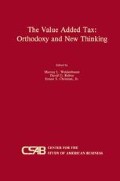Abstract
Pressures for exemptions and other preferential treatment under consumption taxes are intense, given the traditional incidence analysis which indicates that consumers bear the burden of such taxes. Regressivity then becomes a politically explosive issue which commands extensive attention. In addition, specific business sectors begin to complain about their administrative and competitive problems and seek redress. To date, there has been no implementation of a national consumption tax by an industrialized country which has not been accompanied to some degree by special treatment in the form of exemptions, “zero-rating” or reduced tax rates for certain goods and services.
Access this chapter
Tax calculation will be finalised at checkout
Purchases are for personal use only
Preview
Unable to display preview. Download preview PDF.
References
See description of European systems from Graham Bannock, VAT and Small Business: European Experience and Implications for North America (Canada: Canadian Federation of Independent Business, 1986), pp. 79–90.
Michael H. Wilson, Tax Reform 1987, Sales Tax Reform (Canada: Department of Finance, 1987).
Dan Throop Smith and Bertrand Fox, An Analysis of Value Added Taxation in the Context of the Tax Restructuring Act of 1980 (Washington, D.C.: The Financial Executives Research Foundation, 1981).
U.S. Department of the Treasury, Tax Reform for Fairness, Simplicity, and Economic Growth, Volume 3: The Value-Added Tax (Washington, D.C.: U.S. Department of the Treasury, November 1984), p. 93.
Ibid., pp. 85–87.
Ibid, pp. 97, 98.
Wilson, p. 45.
Ibid.
Treasury, p. 102.
Ibid., p. 103.
Ibid., p. 111. Not all the effects of the VAT are removed by the credit, according to the Treasury. First of all, low income families may borrow and spend beyond their incomes and, second, the credit is targeted to remove the effects of the VAT from essential consumption only.
Ibid., p. 105.
American Bar Association, Report of the Special Committee on the Value-Added Tax of the Tax Section of the American Bar Association (Washington, D.C.: American Bar Association, 1977), p. 61.
American Bar Association, p. 61.
Treasury, p. 59.
American Bar Association, p. 209.
Treasury, p. 61.
Wilson, p. 39.
Charles McLure, The Value Added Tax (Washington, D.C.: American EnterprisAmerican Bar Associatione Institute, 1987), p. 73.
Wilson, p. 39.
McLure, p. 79.
Editor information
Editors and Affiliations
Rights and permissions
Copyright information
© 1989 Kluwer Academic Publishers
About this chapter
Cite this chapter
Raboy, D.G. (1989). Preferential Treatment: The Implications for Horizontal Equity Among Companies. In: Weidenbaum, M.L., Raboy, D.G., Christian, E.S. (eds) The Value-Added Tax: Orthodoxy and New Thinking. Springer, Dordrecht. https://doi.org/10.1007/978-94-009-2496-3_5
Download citation
DOI: https://doi.org/10.1007/978-94-009-2496-3_5
Publisher Name: Springer, Dordrecht
Print ISBN: 978-94-010-7626-5
Online ISBN: 978-94-009-2496-3
eBook Packages: Springer Book Archive

